Design decisions for buildings and communities are critical to efforts to increase local and regional resiliency. Building designers — of residential, institutional, and commercial structures — should strive to incorporate passive and active survivability concepts into new and renovated structures.
Community planners and developers need to incorporate concepts that increase the capacity to maintain transportation flow, strategies to handle water management, and infrastructure approaches that will withstand a variety of risks.
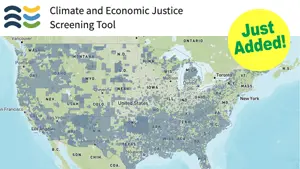
Climate and Economic Justice Screening Tool
The Climate and Economic Justice Screening Tool from the Council on Environmental Quality features an interactive map and uses datasets that are indicators of burdens in eight categories: climate change, energy, health, housing, legacy pollution, transportation, water and wastewater, and workforce development.
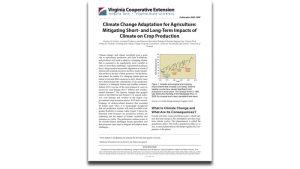
Climate Change Adaptation for Agriculture: Mitigating Short- and Long-Term Impacts of Climate on Crop Production
The Virginia Polytechnic Institute and Virginia State University produced this publication in 2014 outlining climate-related challenges facing agriculture and some options for mitigating and adapting to them. Included in the publication are adaptation strategies and conservation techniques touching on soil water-holding capacity, tillage, crop rotations, drainage, irrigation, nitrogen use, and buffers.
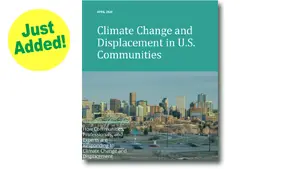
Climate Change and Displacement in U.S. Communities
EcoAdapt conducted a survey with the Strong, Prosperous, and Resilient Communities Challenge to determine if and how people working to address displacement pressures are considering the effects of climate change. This survey is part of a broader project in collaboration with the Urban Displacement Project to better understand the intersections between climate change and displacement pressures.
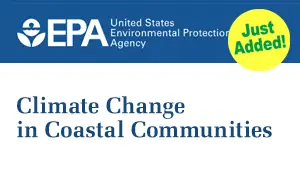
Climate Change in Coastal Communities
US EPA maintains a website that focuses on essential information for coastal communities planning for the effects of climate change.
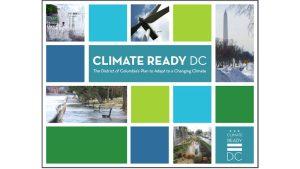
Climate Ready DC: The District of Columbia’s Plan to Adapt to a Changing Climate
Climate Ready DC is the District of Columbia’s strategy to make the District more resilient to future climate change while helping to ensure that our city continues to grow greener, healthier, and more livable.
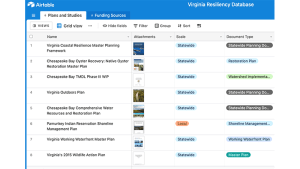
Coastal Resiliency Database
The Coastal Resiliency Database compiles proposed projects, plans, studies, and funding sources that support flood resiliency within Virginia’s Coastal Zone.

Envision Rating System for Sustainable Infrastructure
Published in 2015, the Envision system is composed of tools, covering all aspects of a product’s lifecycle, that are meant to introduce sustainability into infrastructure projects.

EPA: Flood Resilience Checklist
Is your community prepared for a possible flood? Use EPA’s Flood Resilience checklist to improve your community’s flood resilience.
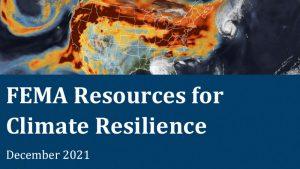
FEMA Resources for Climate Resilience
In December 2021 the Federal Emergency Management Agency (FEMA) published “FEMA Resources for Climate Resilience.” This publication provides a roadmap of FEMA programs and initiatives that advance community climate resilience. Building resilience is a long-term, ongoing process and this resource offers guidance for each step along the way – including funding opportunities, applicable FEMA programs, tools, and resources.
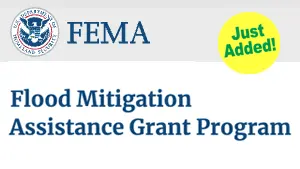
Flood Mitigation Assistance (FMA) Grant Program
The Flood Mitigation Assistance grant program is a competitive program that provides funding to states, federally recognized Tribal governments, U.S. territories, and local governments.

Climate and Economic Justice Screening Tool
The Climate and Economic Justice Screening Tool from the Council on Environmental Quality features an interactive map and uses datasets that are indicators of burdens in eight categories: climate change, energy, health, housing, legacy pollution, transportation, water and wastewater, and workforce development.

Climate Change Adaptation for Agriculture: Mitigating Short- and Long-Term Impacts of Climate on Crop Production
The Virginia Polytechnic Institute and Virginia State University produced this publication in 2014 outlining climate-related challenges facing agriculture and some options for mitigating and adapting to them. Included in the publication are adaptation strategies and conservation techniques touching on soil water-holding capacity, tillage, crop rotations, drainage, irrigation, nitrogen use, and buffers.

Climate Change and Displacement in U.S. Communities
EcoAdapt conducted a survey with the Strong, Prosperous, and Resilient Communities Challenge to determine if and how people working to address displacement pressures are considering the effects of climate change. This survey is part of a broader project in collaboration with the Urban Displacement Project to better understand the intersections between climate change and displacement pressures.

Climate Change in Coastal Communities
US EPA maintains a website that focuses on essential information for coastal communities planning for the effects of climate change.

Climate Ready DC: The District of Columbia’s Plan to Adapt to a Changing Climate
Climate Ready DC is the District of Columbia’s strategy to make the District more resilient to future climate change while helping to ensure that our city continues to grow greener, healthier, and more livable.

Coastal Resiliency Database
The Coastal Resiliency Database compiles proposed projects, plans, studies, and funding sources that support flood resiliency within Virginia’s Coastal Zone.

Envision Rating System for Sustainable Infrastructure
Published in 2015, the Envision system is composed of tools, covering all aspects of a product’s lifecycle, that are meant to introduce sustainability into infrastructure projects.

EPA: Flood Resilience Checklist
Is your community prepared for a possible flood? Use EPA’s Flood Resilience checklist to improve your community’s flood resilience.

FEMA Resources for Climate Resilience
In December 2021 the Federal Emergency Management Agency (FEMA) published “FEMA Resources for Climate Resilience.” This publication provides a roadmap of FEMA programs and initiatives that advance community climate resilience. Building resilience is a long-term, ongoing process and this resource offers guidance for each step along the way – including funding opportunities, applicable FEMA programs, tools, and resources.

Flood Mitigation Assistance (FMA) Grant Program
The Flood Mitigation Assistance grant program is a competitive program that provides funding to states, federally recognized Tribal governments, U.S. territories, and local governments.
